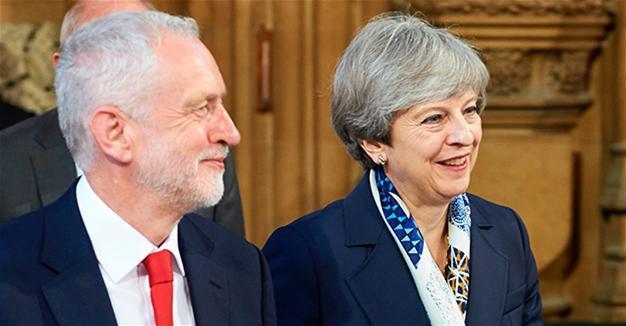Britain’s May promises to listen to businesses’ concerns on Brexit as queen presents government program
LONDON-Reuters

AFP photo
British Prime Minister Theresa May promised on June 21 to listen more to businesses’ concerns about Brexit as Queen Elizabeth formally opened parliament by announcing the government’s program for the next two years.
Chastened by an election result which left her Conservative Party short of a majority in parliament, May also watered down pledges on social care reform, education, corporate governance and energy markets.
The queen told lawmakers from both the upper and lower houses of parliament that the government is committed to building “the widest possible consensus” on Brexit, working with parliament, devolved administrations, business and others.
What is usually a ceremonial address, dominated by costumed pageantry, has become a crucial test of May’s ability to run the country during its most testing period for generations.
“My government’s priority is to secure the best possible deal as the country leaves the European Union,” the queen said.
The Queen’s Speech, prepared by ministers and read out by the monarch, comes at a time of unprecedented political flux, with May yet to secure a deal with Northern Ireland’s Democratic Unionist Party (DUP) to prop up her government.
“The election result was not the one I hoped for, but this government will respond with humility and resolve to the message the electorate sent,” May said in remarks introducing the policy plan.
“First, we need to get Brexit right. That means getting a deal which delivers the result of last year’s referendum and does so in a way that commands maximum public support.”
Lawmakers will have to approve the speech in a vote, expected next Thursday, which will be a de facto vote of confidence. Minority governments are a rare occurrence in British parliamentary politics where the electoral system usually produces a governing majority.
The legislative program spelt out a Brexit-dominated set of policies, that indicated May was keen to maintain broad support for leaving the European Union.
“While this will be a government that consults and listens, we are clear that we are going to see Brexit through, working with parliament, business, the devolved administrations and others to ensure a smooth and orderly withdrawal,” May said.
A briefing document issued alongside the speech said the government would intensify its consultations with businesses and other interested parties to “test and validate positions and to continue to build support from the business community as we move forward.”
May’s authority is badly damaged as Britain begins negotiations on leaving the EU. Four militant attacks have raised questions about her grip on national security, and the death of at least 79 people in a tower block fire has become a flashpoint for public anger at her party’s record in government.
Her plans will need the support of Northern Ireland’s DUP, which is expected to use its 10 votes to back her in exchange for more funding to the province, policies geared towards boosting its economy and assurances that Brexit will not cut it off from the neighboring Irish Republic.
But that deal has yet to be announced nearly two weeks after a national election which May had called in a bid to strengthen her majority, but which ended up weakening her grip on power.
Instead, May’s program for government was largely restricted to the technical work of making sure Brexit can happen: a bill that sets out how the government will transpose huge swathes of EU law into British law and separate bills on related topics such as immigration, customs and fisheries.
The government set out details of this “Great Repeal Bill” in March.
